Christopher Plummer: Revisiting Our Interviews with The Canadian Legend of Stage and Screen

Christopher Plummer appeared on the cover of Zoomer magazine twice — in 2010 and again in 2015. Above, one of the photos Canadian rocker Bryan Adams shot of Plummer for the 2010 story.
Legendary Canadian actor Christopher Plummer died Friday at his home in Connecticut at age 91. The New York Times reports that Plummer’s wife, Elaine Taylor, said that he died following “a blow to the head as a result of a fall.”
Plummer, who was born on Dec. 13, 1929 in Toronto, was one of Canada’s most revered and versatile performers, thrilling audiences on stages from Stratford to Broadway while performing in roles ranging from Shakespearean kings to Old Hollywood titans. His big screen career proved equally as fruitful, putting in celebrated turns like in the 2011 film Beginners, in which he played an aging widower who comes out as gay to his family. The role earned him his best supporting actor Academy Award which, at age 82, made Plummer the oldest Oscar winner in any acting category in history (a record that still stands).
But for all his stage and screen roles — including stints on television shows like the British-Canadian TV drama Departure, which he was still filming at the time of his death — to many fans Plummer will always be Captain von Trapp, the patriarch of the musical von Trapp clan from The Sound of Music. It’s a role for which he was known to show disdain, telling Zoomer once that people, “have no idea how I loathed playing that part.”
In fact, Plummer appeared on the cover Zoomer magazine twice — once in 2015 and the other time in 2010, when he was photographed by Canadian rocker Bryan Adams. Below, we present both cover stories in their entirety, featuring Plummer discussing his life, career and why he so disliked The Sound of Music.
The Winter of His Content, November 2015
Story by Mike Crisolago
Photography by Chris Chapman

“That’s the length of red carpet I want,” Christopher Plummer quips, gesturing toward the short swath of scarlet fabric leading to the entrance of his downtown hotel ahead of the 2015 Toronto International Film Festival. “Can you imagine,” he chuckles, “having a red carpet at home and just practising walking up and down it?”
It’s a joke, sure, but not a bad idea given the succession of professional triumphs Plummer has enjoyed in the last decade — good fortune, in fact, that his own mother once predicted wouldn’t come until his greying years.
“Well, I’m sure she thought it was going to be sooner,” Plummer, 85, laughs as we’re served at the hotel bar, packed with cocktailing patrons unaware of the titan of stage and screen in their midst. We sit in cushy chairs in an elevated corner of the room – fittingly reminiscent of a stage.
“I’d been successful since I was in my 20s,” he continues, “but a lot of people think that [winning the Oscar] is the be all and the end all. That just comes nicely toward the end of a career.”
Plummer, of course, is referring to his 2012 best supporting actor Academy Award for the film Beginners which, at 82, made him the oldest Oscar winner in history. The last decade also included his first Oscar nomination, again for best supporting actor, in 2010 for The Last Station, celebrated turns on Broadway and at Stratford, a return to his Tony-winning role in the stage and film versions of Barrymore and his popular autobiographical one-man show, A Word or Two.
The most success he’s enjoyed this side of Salzburg, some call it a career renaissance. But not Plummer.
“My whole life in the theatre has been rich, and that’s what counts because that’s where all the great roles are played,” he explains, countering any revival babble. “[On stage] I feel exactly as I did as a child — more so now than in middle age. We’re going back to our senile years. It’s fun.”
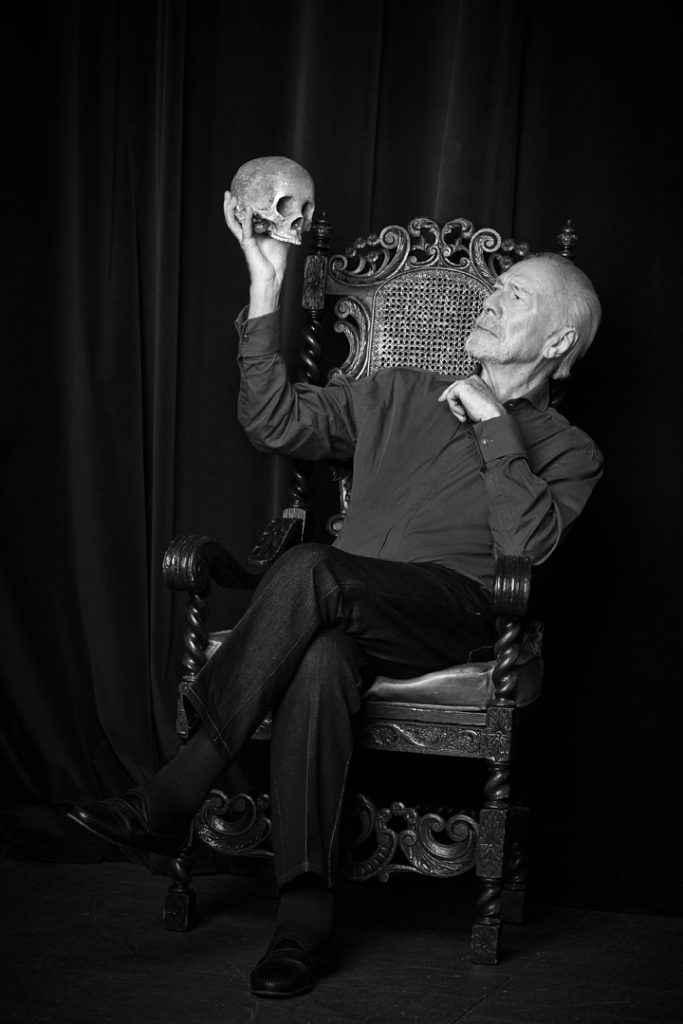
He laughs and takes a sip of espresso. Dressed in a light jacket, blue shirt and jeans, he cuts a dashing figure, his piercing gaze and handsome Old Hollywood jawline undercut by his belt, emblazoned with little skulls and crossbones. It’s an accidental, albeit fitting, juxtaposition for a man blessed with matinee idol looks who claims, “There’s nothing more boring than a leading man. I couldn’t wait until I was a character actor in my 40s. The roles immediately got more interesting and more diverse.”
If there’s even the slightest notion of a career renaissance, Plummer traces it back to 1999 and the Michael Mann film The Insider, in which he portrayed legendary 60 Minutes journalist Mike Wallace opposite Al Pacino and Russell Crowe.
“The minute that was out,” he recalls, “the scripts started to come in better written and at a higher level. I had already been doing fairly well as far as good scripts are concerned. And it just was a slow rise.”
Renaissance Man
It’s not an uncommon circumstance, says Plummer’s Last Station co-star Helen Mirren, whose own career enjoyed a late swell of popularity.
“Chris’s career has been absolutely constant,” she declares, playfully snickering at the suggestion of a Plummer comeback. “He was always an incredibly substantial theatre star. Your film career, for whatever reason, because you don’t want to do film for two or three years and then you come back, over a long period of time, fluctuates.”
Plummer’s career, then, is firmly on the upswing. In his current film, Remember, out this month, he portrays a dementia-stricken Holocaust survivor who attempts to hunt down the Nazi guard who killed his family. It’s a performance that earned a 10-minute standing ovation at the Venice Film Festival days before its TIFF premiere.

“I’ve never done anything like that before in my life,” he says of the role. “I felt I was two different men, actually. One that memory loss makes totally anonymous, and the other [a] sort of terrible kind of revenge that stirs the blood and keeps you going.”
“It’s like playing tennis with a great player: you don’t know where the ball is going to go until it lands. And you’d better be there,” screen legend Martin Landau, fellow Oscar-winner and Remember co-star, says of acting opposite Plummer. “Here’s a guy who could play Richard III tomorrow and this character on the day after.”
Remember director Atom Egoyan calls Plummer’s performance “radical” while noting the challenges of making him appear less “dapper” for the part.
“I went to visit him at his house, and we were trying to think about how his look should be [in the film]. He had just come out of the shower and his hair was slicked back and he sounded so vulnerable. And I went, ‘Chris, that’s how you have to look.’”
The film itself is significant both for its take on the Holocaust as a modern-day revenge tale as well as for its portrayal of the main character as an older person with dementia.
“For a while, everybody was totally indifferent to the aged and their problems. Now we’re living longer and we’re all on drugs and we’re having a ball,” Plummer laughs. “We’re hiding our age better and threatening to go beyond 100. I think the aged are being looked after better in the theatre and in movies.”
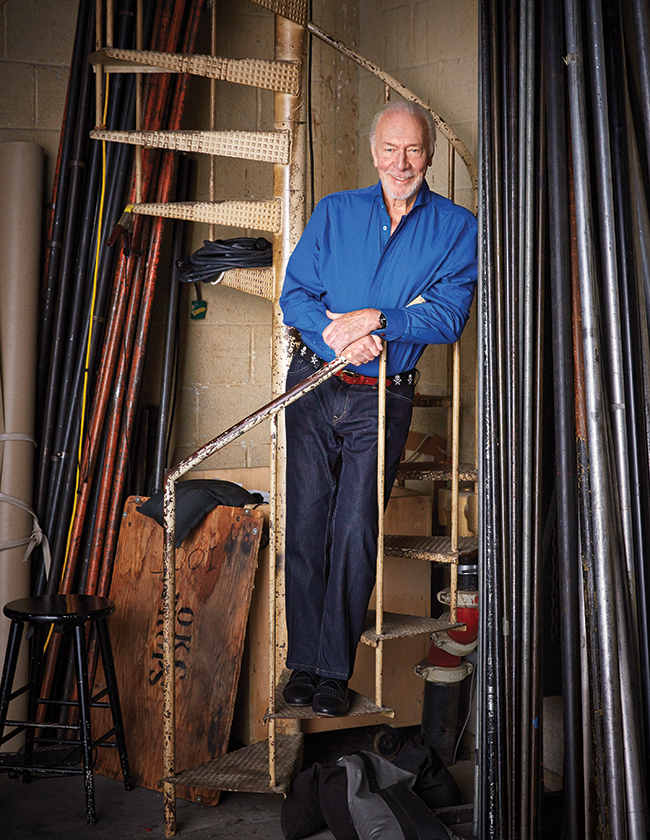
There is one piece of unfinished business, however, that weighs on his mind. Plummer, who studied piano in his youth, plays a classical piece in the film. “Nobody gave me credit for it,” he notes, disappointed, “so the audience will think somebody else played.”
It’s a rare blip in Plummer’s poised demeanour. The opposite end of that spectrum — heartfelt gratitude — shows itself later when his wife, British actress Elaine Taylor, offers a snack. The couple celebrate their 45th wedding anniversary this year. It’s a union Plummer credits as a key influence in both his life and career, from Taylor’s “enormous” artistic taste to her healthy cooking.
“She’s my best friend,” he adds, before spilling the secret of their atypically long Hollywood marriage. “We can part during the day and then get together for dinner and talk about it. We’re not in each other’s pocket. [That] couldn’t be more boring and kills marriages. I’m very lucky.”
Lucky indeed, though there are no plans for a nice, quiet retirement together.
“Nobody retires in our profession. We just go on until we drop,” Plummer insists wryly. “And acting — just learning all those lines helps keep [the brain] alive.”
It’s a process that can, under the right circumstances, breed a certain richness in an artist’s performance, says Canadian actor R.H. Thomson, 67, whose 30-plus years on stage and screen afford him a unique insight into the evolution of an actor’s craft. He recalls, at age 12, being “agog at the panache and the romanticism” of Plummer’s Cyrano de Bergerac at Stratford.
“There is a branch of the artist going through their life that they start stripping away things as they get older, all the dressing and the curlicues and the embellishments, and it just [gets] simpler and more powerful because of it. [That’s] Beethoven’s quartets and that’s late Bach and that’s Tolstoy and I think that’s Christopher as well.”
The Future is Bright … Unless You Bring Up The Sound of Music
With retirement out of the question there are more acting projects in the works. “I always look for the next role to be as different as possible from the one I just did.” That includes an upcoming action thriller and a possible remounting of A Word or Two.
Of course, one can’t discuss Plummer’s career without talk inevitably turning to that movie — you know, the blockbuster musical with the children and the “Edelweiss” that he famously spurns. I approach the topic gently.
“Many people,” I ease in, “tend to tip-toe around the subject of The Sound of Music with you.”
“Yeah, quite right,” he shoots back, laughing. “And they should. Sometimes they should tip-toe right out the friggin’ room.”
The film, which Plummer actually praises as “the all-time family movie,” marked its 50th anniversary this year.
“It’s got everything, a wonderful score by Rogers and Hammerstein. I just didn’t think my part was very exciting. When people say, ‘You’re so wonderful in that movie,’ I want to say, ‘Oh piss off.’ They have no idea how I loathed playing that part.”
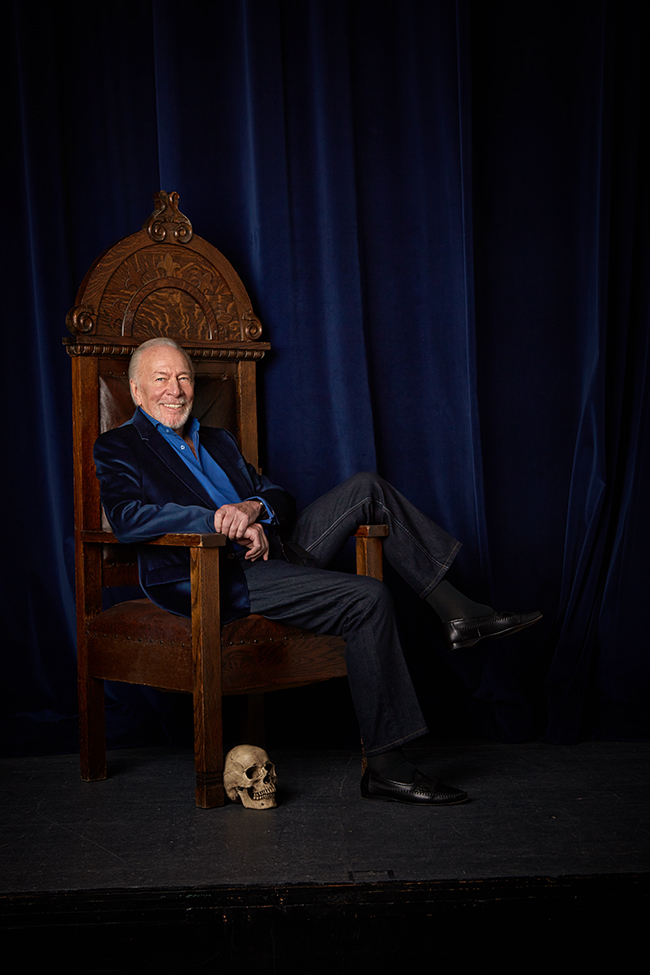
His co-star Julie Andrews, however, paired with Plummer for a recent Vanity Fair interview and noted, “There were so many potentially cloying possibilities. You were the glue that bonded us all together because you wouldn’t allow that.”
And there’s also irony, which I point out cautiously, in the fact that of all the brilliant performances he’s delivered in the past 70 years, it’s the one he despises most that is best remembered.
“The world saw that movie, and the world doesn’t come to the theatre,” he concedes. “You don’t get that sort of adulation until you do a blockbuster. I’m grateful for it because it enabled me to afford to do things that I wanted to do. [And] a good table at a restaurant.”
The Sound of Music, though, is merely a single role in a career built on noteworthy performances — many of which are documented in his famously candid 2008 autobiography, In Spite of Myself, which reads almost like a history of his craft and the eclectic mix of characters he encountered along the way. Plummer balks, however, when asked if he ever considers his own legacy.
“There’s no time,” he exclaims with a smile, the topic ringing so mundane you’d think I’d asked him about his career renaissance again. “I just keep on doing it. And if it looks like a rather barren year as far as film I’ll go back into theatre. And I’ll write something. And then when I’m not working I play tennis, I play the piano.”
And yet, despite a decades-long career punctuated by standing ovations and artistic honours and the promise of steady work still to come, even Christopher Plummer harbours aspirations from his youth that, so far, remain unfulfilled.
“Well, of course, I always wanted to be a pianist. And I did study, but there’s no time,” he says, regretfully. “I should have done that one 500 years ago. I would have loved to have shared both professions equally, you know. It would have been great.”
Then a coy smile creeps across his face as he thinks back to that one scene in Remember where he tickles the ivories. He laughs.
“I’ve got to make sure that credit goes on the screen.”
Enter Stage Right, Zoomer magazine, Summer 2010
Story by Kim Izzo
Photography by Bryan Adams

Cement floors are hell on the body. When the actor Christopher Plummer walks into the small lounge for our interview, he moves slowly, carefully. The leather club chairs are eschewed for a more upright, straight-backed one, and he gingerly lowers himself into it and smiles. “It’s my back,” he explains. “The stage here is cement, which is tough on actors. A lot of modern stages are padded.
Even wooden ones give but when they built this stage, cement was the thing.” No padding, no give, just plain hard.
First of all, “here” is Stratford, Ont., home of the Shakespeare Festival where Plummer is set to play Prospero in The Tempest. Secondly, it would be wildly inaccurate to imply that Plummer is frail or not up to the task of performing the two-and-a-half-hour play night after night for its lengthy run from June 11 to Sept. 12. Quite the opposite. But on this day, an hour before he will see the staff massage therapist (that cement stage takes its toll on actors of all ages), he is stiff and aching. But most of all, he is charming and sharp.
At 80 years of age, this star of stage and screen is in high demand, and for characters that don’t relegate him to elderly sages or grumpy old men. Indeed, his roles are as compelling and groundbreaking as any he played in his youth.
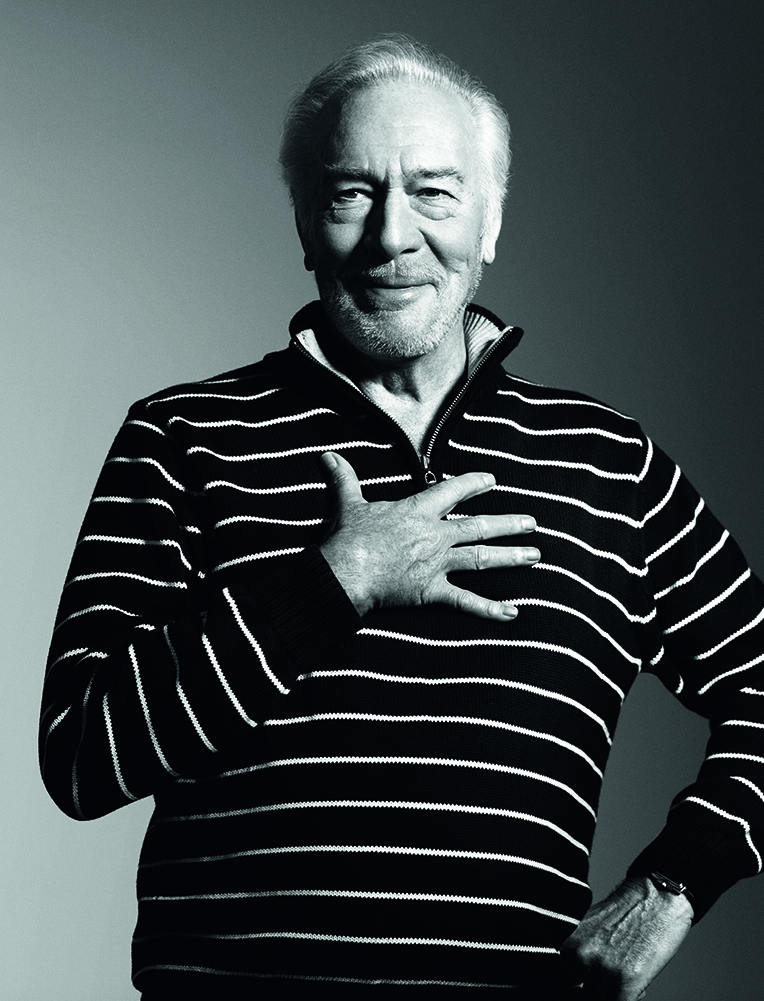
Wearing his signature scarf and sipping a cup of coffee, he is excited to be back here. In 2008, he starred in the production of Caesar and Cleopatra. In 2002, he headlined King Lear, eventually taking the production to New York’s legendary Lincoln Center. In fact, Plummer’s history with Stratford goes back to 1956 when he appeared in Henry V and he has performed at the venue off and on ever since.
Which brings up his decision to play Prospero at this point in his career. “It’s expected in a way. You know, toward the end of your life you’re going to play Prospero. Everybody thinks of it as a sort of farewell to the stage,” he admits. “Well, it’s not farewell as far as I’m concerned. I hope to keep working for the next 10 or 20 years.”
His autobiography, In Spite of Myself, was published two years ago to positive reviews — a response that thrilled Plummer. “It blew my mind,” he confesses modestly. “People thought it was a good history of the theatre as well. I never wanted it to be a ‘me, me, me’ book, which it wasn’t.”
A portion of the Stratford chapters were excerpted in this magazine in 2008 and described quite a raucous place, brimming with booze, women and mad antics that belie the calm atmosphere of this bucolic town. One wonders if this mayhem still exists behind backstage doors.
“Everything’s changed like mad and, you know, that was close to the war ending, and everybody was celebrating. It was an extraordinary time,” he says with a wicked grin. “It was a great drinking time. How the hell we got through all of the wonderful work that was done, I don’t know how we did it. The ’60s were rather like a revival of the ’20s. No one was particularly sure of the future. And quite rightly because the future became a great deal duller, sadly, and more dangerous.”
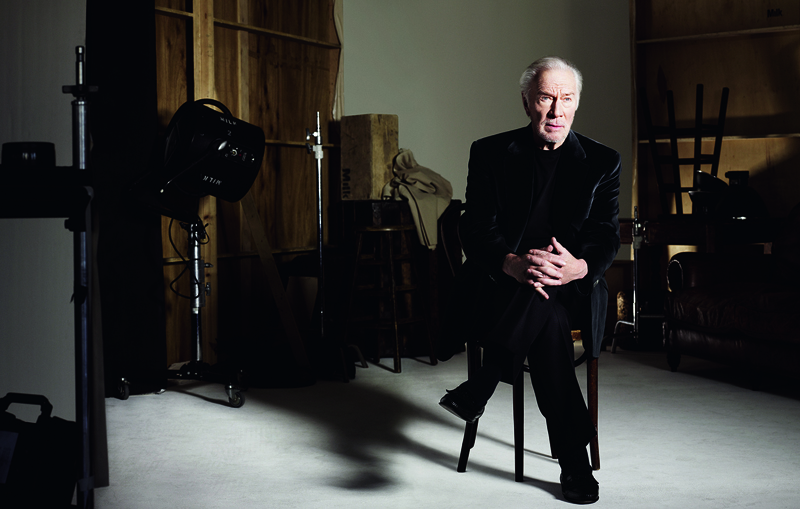
Of course, a lot has happened since the ’60s and, indeed, in the two years since the publication of his memoir. In 1965, the enormous success of The Sound of Music catapulted Plummer to superstardom. Decades and many film, stage and television roles later, he made a small film, The Last Station, released in 2009, which brought him several award nominations, including his first-ever Academy Award nomination this year. He says it was nice to get the nomination but admits he was surprised it was for that film.
“Although I thought the movie was a very good little movie, but it was a sort of gentle movie, except for a few theatrical flare-ups between Helen and myself, and I didn’t expect it.”
Helen, of course, is Oscar-winning, Dame and, at 64, frequent member of various world’s sexiest women lists, Helen Mirren. They’ve been friends for years but The Last Station was their first time working together.
“I think that that’s the honour, you know, the five top performances and so on. To be among them is honour enough. Somebody’s got to win, but we can’t be compared to each other. The subject matter and the roles are so different. So I was thrilled.”
Thrill aside, once it became clear that his performance was gathering momentum, Plummer found himself in the throes of award season, posing on the red carpet and attending special luncheons and photo calls. “It’s a shame in a way that awards have to be taken so seriously and blown out of all proportion because, while it’s nice to receive them, particularly when it’s your own peers that are voting, it’s not what we are in it for,” he explains. “We’re here to do some extraordinary work, if we can, and one has spent one’s whole life doing that without any kind of Oscar nod. So, I just think that awards are just for business, really, they’re business awards.”
Plummer knows the business inside and out. He has spent his career moving shrewdly and seamlessly between film and stage roles. For an actor of his magnitude and gravitas, performing Shakespeare is a given, but I wonder how difficult it is to choose a screenplay that doesn’t come with the pedigree of The Tempest.
“First of all, it has to have some quality. Or, if it doesn’t, it has to have money,” he grins boyishly. “So you’re either doing the money picture or you’re going to do the quality picture. And both are terrific because the money picture makes you able to afford to go back and do the theatre, and the quality picture keeps you in the minds of good filmmakers.”
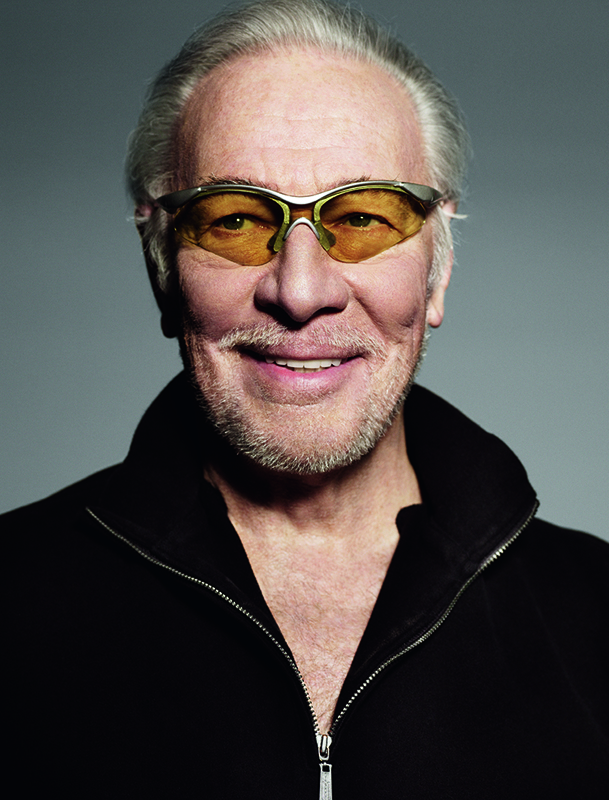
As he speaks about his work, it becomes clear that to watch Plummer is to witness a man who has discovered the secret to longevity, albeit unintentionally. Yet, how he has lived his life reads like a to-do list for aging well.
For one thing, there’s his decision to stay active. “I’ve done sports all my life. In fact, I’ve only just recently given up tennis because I thought I’d save my knees for the work,” he says. “I’ve enjoyed tennis since I was five years old and so I miss it dreadfully, but there’s always something happening to your body when you challenge it. And there’s no bigger challenge than doing these great Shakespearean roles. You always do little things to yourself, like I’ve done to my sacroiliac, which is always uncomfortable, even painful, but it goes away and it’s fine.”
He is not one to complain or coddle his injuries, telling me that, around 25 years ago, doctors told him he needed a knee replacement, but he just kept going and has been fine ever since. Which brings up his next point: actors are athletes, and this requires dedication to the physical self.
“People think it’s all done with mirrors. We have to do some strangely difficult work,” he explains, adding that The Tempest requires cast members to fly through the air with the help of wires, and others need to call on their dance and acrobatic backgrounds. “You play a great play like The Tempest, it’s long — two-and- a-half hours. You’ve walked round and round. You’ve walked, oh God, several, several miles.”
And all on that cement floor. Back pain aside, Plummer insists it is his work that has helped his endurance. “It does damage but it also keeps you young,” he explains. “Keeps you alive and your body in tune.”
And then there’s the mind. “[The theatre] is a great challenge for memory,” he says of its need for pages upon pages of memorization. “That’s the most important thing you have in life. This is a wonderful exercise to keep it alive.”
And having a wife, Elaine Taylor, whom he married in 1970, with a Cordon Bleu cooking background has its advantages. “Another thing that kept me going was a proper diet. It’s vitally important,” he says. “My wife has great instincts. She knows just what to put in.”
He is devoted to his wife. And family has come to play a more important part in his life than it had in his youth. Plummer has one daughter, Amanda, from his first marriage to actress Tammy Grimes. A Tony Award-winning stage actress, Amanda is widely remembered for her pivotal scene in Pulp Fiction as Honey Bunny, opposite Tim Roth. Plummer admits in his memoir that he had virtually no contact with her growing up, but their relationship has managed to survive. “My neglected daughter — whom I hardly knew except through her work, has become more of a friend now, and I think we feel much closer than we have in the past,” he writes.
He has also called retirement “death.” “I love working because it keeps you alive,” he says. “I can’t think of anything worse than retirement and I feel so sorry for people who retire at an early age. Their lives are over, they really are. All they do is play golf and watch television. Unless they have some extraordinary resources and they want to do a second career.”
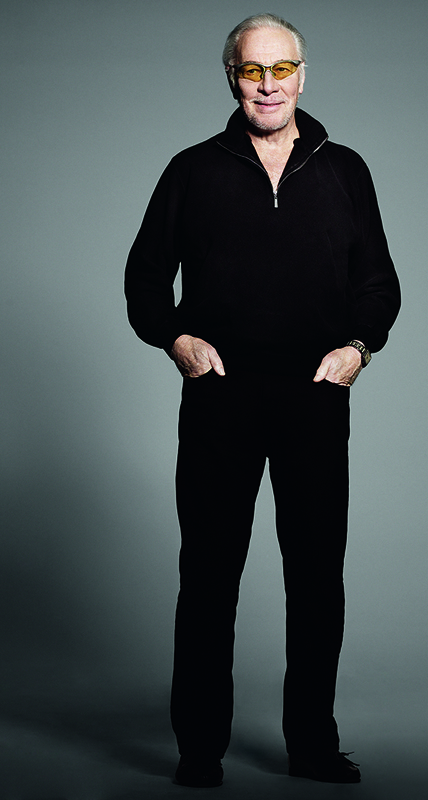
Fortunately, Plummer’s chosen path allows him to constantly reinvent and challenge himself, staving off any feelings of boredom. “I always say that it’s sad that most people are not happy with what they’re doing, that they spend their lives and can’t wait to get out of their job and retire. I can’t wait for my next job in my profession.”
Up next for Plummer is a film role as a 70-year-old widower who comes out to his son, played by Ewan McGregor, after his wife dies. It is the first time Plummer has played a gay character. “I was thrilled to play it, and it was very well written.” It also marks the first time he performs a kissing scene with a man, the Croatian actor Goran Visnjic, who rose to fame as the resident heartthrob on ER after George Clooney departed.
If you read his autobiography, one thing is perfectly clear, Plummer has a way with the ladies, so kissing a man must have been, at the very least, unusual if not uncomfortable. He nods, admitting that both he and Visnjic, stood on set grunting about it.
“I’m not going to kiss, I’m not going to kiss and all that nonsense,” he laughs. “There were no naked love scenes but there’s great tension in it.” The film, Beginners, is based on a memoir and is still finding distribution. He is also in negotiations for two other films, but those remain under wraps. Plummer also admits to the possibility of taking The Tempest to New York as he did with Lear. In other words, he’s booked until 2012.
Since he seems busier than Betty White, I wonder what, if anything, he does in his remaining down time. It’s taken up with concerts and entertaining friends at his homes in Connecticut and Palm Beach, he says.
His other passion is travel. He has had the fortune of seeing many sights from the vantage point of a movie set, but there are a few places that remain uncharted by his eyes. “There are parts of Africa I’ve not seen yet. I’ve never been to India or Egypt and I’d love to go there,” he says and bemoans the lack of pleasure one derives from air travel these days with heightened security and lessened service. “The glamour of travel ended with the Concord.”
That may be true, but it’s crystal clear that when it comes to Christopher Plummer’s own brand of joie de vivre, there is, thankfully, no end in sight.
RELATED:
Christopher Plummer, Martin Landau and Atom Egoyan Talk their New Thriller Remember
Christopher Plummer and Donald Sutherland: A Tale of Two Gettys
Christopher Plummer Honoured At Canadian Screen Awards